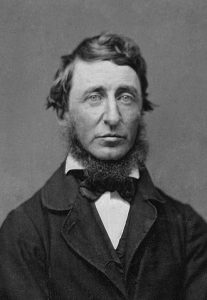
Ralph Waldo Emerson followed the rules for respectable gentlemen of the first half of the 19th century and only wore decent sideburns.
One of the most delicate and subtile questions of the philosophy of beards – an underestimated area on which I am currently undertaking a larger project – is the matter of the fake beard. When the fake beard comes into consideration the trouble begins: ordinary men can become philosophers, boys can be men, weaklings can be heroes … and even women can become men! How can one still maintain that the beard is somehow an authentic expression of one’s inner self if the mere possibility of a fake beard comes into play? Does this possibility not imply that every beard is in fact a mere mask, a fake beard?
This and other crucial questions of beardedness I will discuss in some upcoming texts – and are discussed in passages of nearly all important figures of modern thought such as Nietzsche, Adorno, and Sartre.
One great passage on the matter of fake beards I had hoped to have found in the work of the famous American essayist Ralph Waldo Emerson (who is, by the way, an often understated source of inspiration for Nietzsche!). It is quoted endlessly all over the internet and goes like this:
When a resolute young fellow steps up to the great bully, the world, and takes him boldly by the beard, he is often surprised to find it comes off in his hand, and that it was only tied on to scare away the timid adventurers.
I do not think that this quote needs much commentary. It is not just an excellent example for the philosophical reflexion on the problem of the fake beard but contains a deep wisdom about life in a concentrated and well-construed form. Just how a sublime aphorism should be written. I also love it because of its particular use of the word „bully“ which wasn’t known to me before.
Ironically, however, after some tormenting research for its precise source (I wanted to look up in its context of course and cite it correctly) and with the kind support of some colleagues who responded to a cry for help which I posted on an anglophone philosophers‘ mailing list1)Namely Björn, Ridvan Askin, Lawrence, Pete Morriss, and Aditi Chaturvedi, whom I want to thank both wholeheartedly and wholebeardedly! it turned out to be a fake quote. It is not by Emerson but by a much less known author called Oliver Wendell Holmes2)1809-1894, a Boston-based physician and writer, not to be confused with his son, a well-known judge and jurist, who lived from 1841 to 1935., from the second chapter of his novel Elsie Venner. Since I want to write about the philosophical and not the literary discourse on the beard this renders this awesome quote unfortunately almost completely worthless for my purpose. Not that I care too much about the distinction between philosophy and literature – one should not blur them but I think it is not possible to draw their borderline precisely; moreover, I would not hesitate to quote from novels by Sartre and poems by Nietzsche in a philosophical article (exactly because these texts often contain more interesting philosophical insights than their philosophical works in a narrow sense do) – but somewhere a – albeit arbitrary – borderline simply has to be drawn and I already have other great quotes which deal with the issue at stake.
One could conclude now:
When a resolute young researcher steps up to the great bully, the famous philosopher, and takes him boldly by the beard, he is often surprised to find it comes off in his hand, and that it was only a fake to impress the timid adventurers.
More interestingly, this is not the first time my research for a insightful quote by a great American thinker ended up like this. An anecdote which is repeated endlessly on the internet goes like this:
Louisa May Alcott reportedly mentioned to Emerson that Thoreau’s neckbeard “will most assuredly deflect amorous advances and preserve the man’s virtue in perpetuity.”
This particular quote interested me because it would have been the only instance in which a woman commented on a philosopher’s beard – they usually prefer to stay silent about them (for whatever reason – a philosophical riddle I haven’t been able to solve so far). At the same time, nearly all male philosophers, even those who hate beards, tend to agree that they attracts the beardless sex. A typical case of male (and, moreover, male philosophers‘) deeply rooted narcissism? I would have been happy even to mention one single woman in my history of the philosophy of beards at all (I have found a few now – and there are quite a few female beard scholars!).
A librarian called Jessamyn West took the effort and looked up the source of this anecdote. She found out that it’s a complete fraud, she couldn’t even find a similar quote in Thoreaus, Emerson’s, or Alcott’s work. She could not even find a single passage on neck beards in one of their works at all.
This finding of course disappointed me – but relieved me at the same time (I think I don’t need to explain why … Let’s just say that I’m possibly a little narciss myself in this regard).
Why do people make up such quotes? They are so many great authentic quotes about beards by great thinkers (both pro and contra beards) that there is simply no need to add fake ones. It is not very probable, however, that these are mere mistakes. Maybe these are deliberate frauds to proove the untrustworthiness of the internet? Or just troll operations „for the lulz“? Is there a philosophical reason to do it? Nietzsche did it on more than one occasion. In Twilight of the Idols he even made a philosophy of forgery out of it:
Never trust a quote that you have not made up yourself.
Maybe my next side project should not deal with fake beards but fake quotes …
(Source of Nietzsche’s photography: https://www.celebrities-galore.com/celebrities/friedrich-nietzsche/home/
Source for all other pictures: Wikipedia)





One Comment
I have meanwhile published a longer essay on the philosophy of beards elsewhere: https://philosophie-indebate.de/3541/indepth-longread-lasst-tausend-baerte-spriessen-gegen-die-aesthetik-des-glatten/
Posten Sie ein Kommentar.